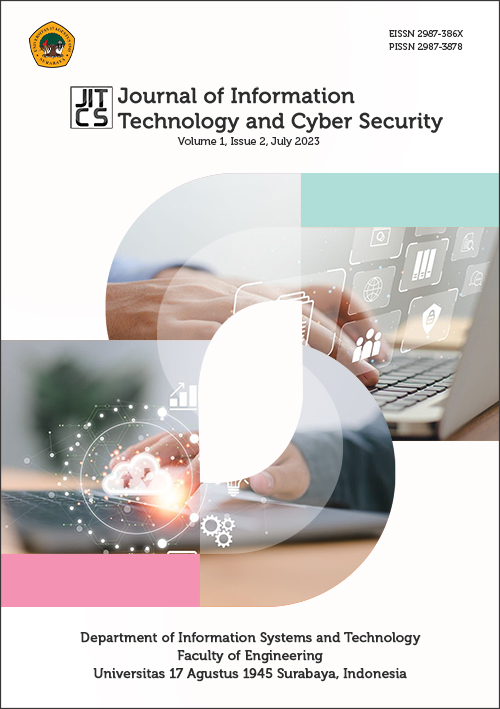Decision Support System for Single Tuition Scholarship Awardees in Higher Education Using Mamdani Fuzzy Inference
DOI:
https://doi.org/10.30996/jitcs.10009Keywords:
Decision Support System, DSS, Fuzzy, Mamdani, scholarshipAbstract
Universitas Madura implements the Single Tuition Fee (UKT) scholarship program in the Informatics department. The current UKT scholarship selection system uses a traditional model that is still not effective, causing obstacles such as inflexibility in registration time. The print-out documents are vulnerable to damage or loss and difficulty searching when it required. The criteria in the current system consisted of a minimum Grade Point Average (GPA) of 3, a letter of family condition, and also student status in semesters 3 to 7. The three criteria are not enough to determine a scholarship candidate. The recruitment process involves only the Head of the Study Program (Kaprodi). The Informatics study program still has many candidates applying for scholarships reaching around 280%. This research proposes a Decision Support System (DSS) using Fuzzy Mamdani with six criteria, including GPA, Achievement, Parents' Income, Parents' Dependents, Semester, and History of not receiving scholarships with the aim of overcoming these problems. The results show that the performance of the proposed SPK is very good, it is shown by the MAPE value of less than 10% and more efficient time than the current system. This system has also been in accordance with the required functions through the black test.
Downloads
Downloads
Published
How to Cite
Issue
Section
License
Copyright Notice based on COPE (Committee on Publication Ethics) for JITCS: Journal of Information Technology and Cyber Security
-
Ownership and Copyright:
- JITCS: Journal of Information Technology and Cyber Security respects the intellectual property rights of authors. The copyright for individual articles published in JITCS is retained by the respective authors, unless otherwise specified.
- The articles published in JITCS are licensed under a Creative Commons Attribution-NonCommercial-NoDerivatives 4.0 International License (CC BY-NC-ND 4.0), which permits use and distribution in any medium, provided the original work is properly cited, the use is non-commercial, and no modifications or adaptations are made.
- JITCS serves as the initial publisher of the articles, providing them with the first publication platform.
-
Permissions and Usage:
- Distribution for Non-Commercial Purposes: Permitted: Users are allowed to distribute the article for non-commercial purposes, provided the original work is properly cited and no modifications or adaptations are made.
- Distribution for Commercial Purposes: Not Permitted: The article may not be distributed for any commercial purposes without obtaining prior written permission from the author(s).
- Inclusion in a Collective Work (e.g., Anthology) for Non-Commercial Purposes: Permitted: Users are allowed to include the article in a collective work, such as an anthology, as long as the use is non-commercial and the work remains unchanged.
- Inclusion in a Collective Work for Commercial Purposes: Not Permitted: The article may not be included in any collective work or anthology intended for commercial purposes without prior permission from the author(s).
- Creation and Distribution of Revised Versions, Adaptations, or Derivative Works (e.g., Translation) for Non-Commercial Purposes: Not Permitted: Users may not create or distribute revised versions, adaptations, or derivative works, including translations, for non-commercial purposes.
- Creation and Distribution of Revised Versions, Adaptations, or Derivative Works for Commercial Purposes: Not Permitted: Users may not create or distribute revised versions, adaptations, or derivative works, including translations, for commercial purposes.
- Text or Data Mining for Non-Commercial Purposes: Permitted: Users are permitted to engage in text or data mining of the article for non-commercial research purposes, provided the original work is properly attributed.
- Text or Data Mining for Commercial Purposes: Not Permitted: Users may not engage in text or data mining of the article for commercial purposes without obtaining explicit permission from the author(s).
-
Attribution and Citation:
- Proper attribution and citation of the published work should be provided when using or referring to content from JITCS. This includes clearly indicating the authors, the title of the article, the journal name (JITCS), the volume/issue number, the publication year, and the article's DOI (Digital Object Identifier) when available.
- When adapting or modifying the published content, proper attribution to the original source should be given, and the adapted or modified content should be shared under the same CC BY-NC-ND 4.0 license.
-
Plagiarism and Copyright Infringement:
- JITCS considers plagiarism and copyright infringement as serious ethical violations. Authors are responsible for ensuring that their submitted work is original and does not infringe upon the copyright or intellectual property rights of others.
- Any allegations of plagiarism or copyright infringement will be investigated promptly and thoroughly. If proven, appropriate actions, including rejection of the manuscript, retraction of the published article, or other corrective measures, will be taken.
-
Open Access Licensing:
- JITCS supports open access publishing and encourages authors to consider publishing their work under the CC BY-NC-ND 4.0 license to promote the dissemination and use of knowledge in the field of information technology and cyber security.
- The specific terms and conditions of the CC BY-NC-ND 4.0 license will be clearly indicated on the published articles.
-
Policy Review: This Copyright Notice will be periodically reviewed and updated to ensure its continued relevance and compliance with copyright laws, ethical standards, and open access principles in scholarly publishing. Any updates or revisions to the notice will be communicated to the relevant stakeholders.
By adhering to this Copyright Notice, JITCS aims to protect the rights of authors, promote proper attribution and citation practices, and facilitate the responsible and legal use of the published content in accordance with the CC BY-NC-ND 4.0 license.







